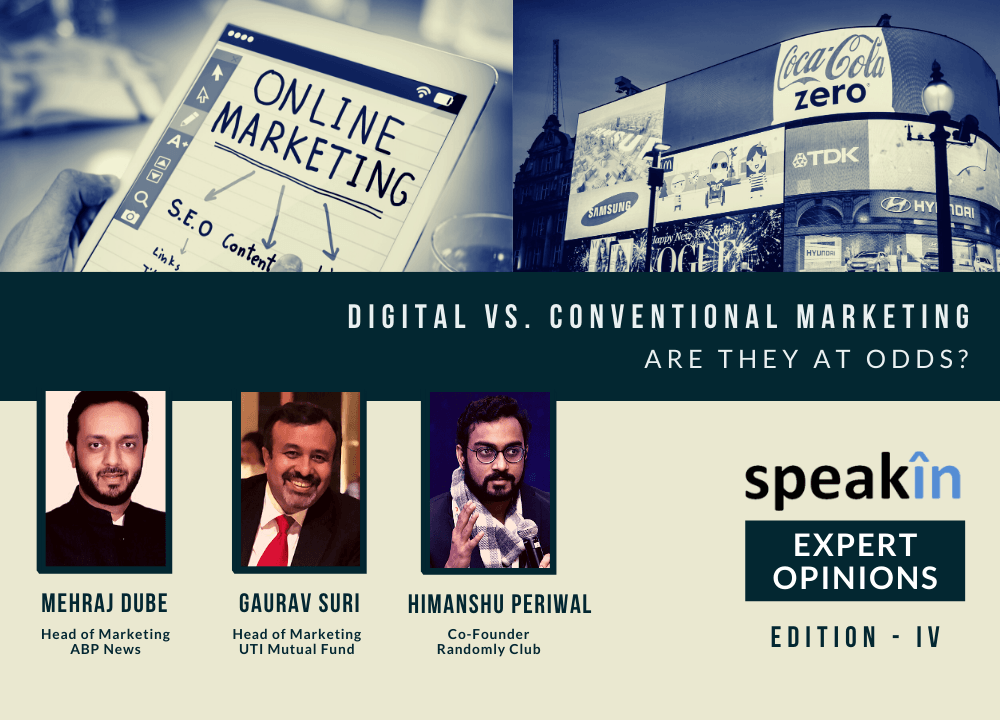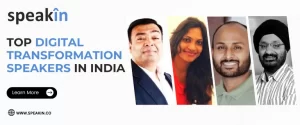Is Digital Marketing at odds with Conventional Marketing?

Marketing, the indispensable function of a business has evolved over the years. From the earlier debates on which traditional marketing route-print, electronic media or radio channel to publish an advertisement in, to now marketeers discussing the modern or digital marketing strategy- search engines, social media, other websites, etc. the avenues to reach out to the customers in recent years have increased.
However, selecting between traditional or digital or opting for an integrated approach is not an easy task especially, if we consider the below statistics.
First for conventional marketing, according to data published on Enterprise Center–
- 56% of consumers find print marketing most trustworthy
- Direct mail marketing yields a 13-to-1 return on investment ratio
- 39% of customers try a business because of direct mail ads
- When making a purchase decision, consumers trust print advertisements 34% more than search engine ads, according to MarketingProfs
Now, for digital marketing, as published on Omnicore–
- 93% of all website traffic is through search engines
- 18% of sale that happens within one day can be attributed to local searches
- 50% of people are more prone to click on a particular brand name if it shows up over once on the search results
- Video content drives nearly 50 times more organic search results than simple text
Though the data doesn’t swing in favour of any particular strategy, yet for many companies, digital is the new mantra. A primary reason for this is the advent of the worldwide web past the year 2000 that interconnected the world and enabled businesses to markets, target and reach out to audiences globally. It also opened avenues for companies of all sizes and kinds to promote its products and services online. Digital provided an additional edge by turning out to be more cost-effective, direct and interactive when connecting with customers, resulting in a better return on investment (ROI).
According to Himanshu Periwal Co-Founder of Randomly Club, “Whether digital marketing is more effective or not, the answer is both Yes and No. In case of a digital product or service, or where the target segment is niche or for startups, and where one can’t spend millions behind a marketing campaign, digital marketing is definitely an effective route.”
Another advantage of internet marketing over traditional is its ability to target audience based on demographics-gender, location, age and interests and tailoring each campaign to their specific needs. This allows making each promotion unique and more effective.
Using analytical and insight tools that can measure aspects such as general trends, inbound traffic, conversion rate, interested audience, and profit, are other reasons that work in favour of digital marketing. Monitoring these on a real-time basis keeps a constant check on the progress of the campaign and even allows immediate modification to improve results. This is unlike traditional marketing, where once the ad has gone for print, it can’t be edited.
“Digital marketing allows marketeers to track every single user from view/click to their entire lifetime engagement with the product. It also allows them to target a few thousand niche customer set, or even run smaller budget campaigns for experimentation,” added Periwal.
However, over-dependence on technology, security concerns and need for constant monitoring are some drawbacks that can’t be disregarded.
According to Gaurav Suri, Head of Marketing for UTI Mutual Fund, “It’s only in our minds that we use terminology like digital and conventional marketing. Technology is never the disruptor. It’s always how people use technology that causes disruption. So the task of marketing is fundamentally to identify opportunities and enable demand creation in manners which resonate with the target group (be it digitally or conventional).”
Thus, some brand managers prefer to be open and devise their marketing strategy basis the requirement. Traditional marketing has incomparable advantages like providing a dedicated customer base and of being considered relatively trustworthy. But tangibility or hard copy material makes it a familiar form of promotion, especially with the older generations. Yet little interaction between the medium and the customers and being a costlier method are some of its limitations.
Sharing his views, Mehraj Dube, Head of Marketing, ABP News stated, “Digital remains just one of the mediums of marketing. The marketer has always connected with its target by coming close to his/her turf. When a large number of consumers are digital beings, it’s only natural for firms to market their products digitally. Digital Marketing is one more arm of the conventional marketing to carry its work forward. In fact, digital businesses like Netflix and Sony Liv use hoardings and newspapers for announcements. Conflict is rather strong between the marketing and finance departments vis a vis how to measure impact and performance? But that’s not news; it will continue to be.”
Deepshikha Kumar, Founder, SpeakIn concluded, “The debate between conventional or digital marketing is a never-ending one. An ideal approach, however, remains to opt for an integrated campaign and combine both print and digital media. When blended well with the business strategy, they both have their advantages else; it is an endless checklist of advertising and promotional to-dos.” So, choose a multi-channel method that leverages the unique benefits of paper with the convenience and accessibility of digital.





